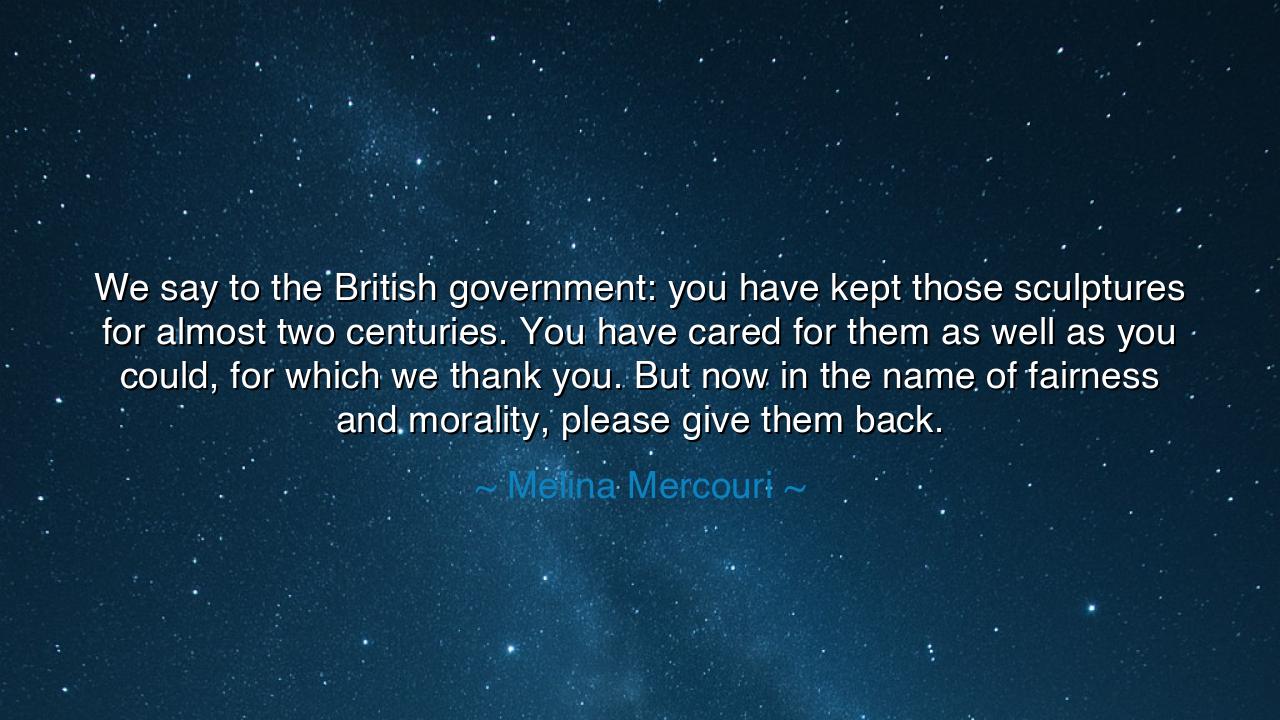
We say to the British government: you have kept those sculptures
We say to the British government: you have kept those sculptures for almost two centuries. You have cared for them as well as you could, for which we thank you. But now in the name of fairness and morality, please give them back.






In a voice filled with dignity and passion, Melina Mercouri, the Greek actress, politician, and cultural champion, once spoke to the world with these immortal words: “We say to the British government: you have kept those sculptures for almost two centuries. You have cared for them as well as you could, for which we thank you. But now in the name of fairness and morality, please give them back.” Her plea was not merely about marble and stone—it was about justice, heritage, and the soul of a nation. It was a call not of anger, but of remembrance; not of vengeance, but of reconciliation. In her words, one hears the echo of a thousand years of Greek civilization crying out to be made whole again.
To understand the meaning of this quote, we must first remember what those sculptures are. They are the Parthenon Marbles, the sacred fragments of the temple that once crowned the Acropolis of Athens, the heart of ancient Greece. Created in the fifth century before Christ, they were more than art—they were a hymn to reason, beauty, and the divine harmony of the world. But in the early 19th century, during the Ottoman occupation of Greece, Lord Elgin removed these masterpieces from their home and brought them to Britain. There they remain, housed in the British Museum, torn from the temple that once shone beneath the Attic sun. For the Greeks, their absence is not merely the loss of art—it is a wound in the spirit, a separation between a people and their ancestors.
Melina Mercouri, as Greece’s Minister of Culture in the 1980s, took it upon herself to speak for her country’s memory. Her plea to Britain was not born of hostility, but of profound respect. She acknowledged that the British had preserved the marbles through time and turmoil—but she insisted that “fairness and morality” demanded their return. Her tone was both noble and ancient, as though she spoke not just for Greece, but for every civilization that has seen its treasures scattered by conquest. Her words carried the wisdom of the ancients, who taught that possession does not equal right, and that honor lies not in ownership, but in restoration.
History offers us countless reflections of this truth. When the Romans conquered Greece, they carried away statues and scrolls to adorn their own cities. Yet the philosopher Cicero, centuries later, rebuked such acts, calling them thefts against the soul of humanity. In our own time, nations across the world—Egypt, Nigeria, India—have raised their voices, asking for their cultural treasures to be returned from distant museums. Mercouri’s plea, therefore, stands not as an isolated demand, but as part of a greater movement: the reawakening of historical justice, the recognition that heritage belongs not to the conqueror, but to the creator.
But there is another layer to her words—one deeper than politics. When Mercouri said, “in the name of fairness and morality, please give them back,” she was invoking the very heart of what civilization means. For what is culture, if not the memory of a people expressed through beauty? What is morality, if not the courage to do what is right when the world has grown accustomed to what is wrong? The Parthenon Marbles are more than fragments of stone—they are the embodiment of humanity’s yearning for harmony between strength and justice. To restore them is to affirm that the past is not dead, but living, and that we, the inheritors of history, are bound by duty to preserve it whole.
It is said that when Melina Mercouri stood before international audiences, her voice trembled not with rage, but with reverence. “They belong to Greece,” she would say, “because they are the essence of Greek identity.” Her appeal touched the hearts of millions, for she spoke not as a politician seeking glory, but as a guardian of truth. She understood that the marbles, divided between London and Athens, were symbols of a greater division—the rift between moral courage and moral convenience. Her call for fairness and morality was, therefore, a call for healing—a restoration of integrity, not merely of art.
So, my children of the present age, take this lesson to heart: justice delayed is not justice denied, but justice waiting for courage. Whether it be the return of stolen treasures, the righting of ancient wrongs, or the acknowledgment of forgotten truths, let us act not out of pride, but out of fairness. To those who hold what is not theirs, show gratitude for their stewardship—but remind them that care is not the same as ownership. To those who seek what was lost, pursue your cause not with anger, but with dignity and patience, as Melina did, for truth spoken with grace is stronger than truth shouted in fury.
And so, let us remember Melina Mercouri’s noble plea. The Parthenon Marbles are not merely stones—they are symbols of the eternal human struggle to reclaim what is sacred. When she said, “please give them back,” she spoke for every people whose history has been divided, every soul whose legacy has been stolen. Her words remind us that the path of morality and fairness is not measured by possession, but by restoration—by the courage to make whole what time and empire have broken. And in this act of returning, both giver and receiver are ennobled—for justice, when fulfilled, purifies not only the wronged, but the wrongdoer as well.






AAdministratorAdministrator
Welcome, honored guests. Please leave a comment, we will respond soon